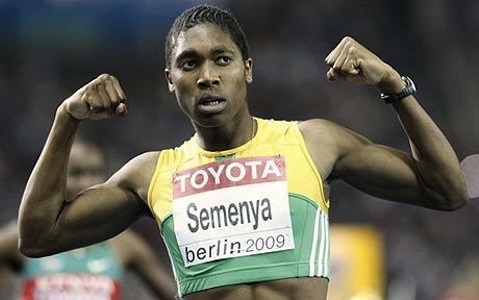This originally appeared on KristinMaschka.com. Republished here with permission.
Three years ago I read about South African runner, Caster Semenya, as her gender was challenged and she was banned from running for nearly a year as a decision was made that, yes in fact, she could compete as a woman. I knew she was competing in London, and still I was caught off guard and got choked up as I she appeared on my TV screen carrying her country’s flag into the 2012 London Olympic stadium.
I have a special empathy for Caster’s story. One summer a long time ago, we were playing in a national softball tournament, and a team we beat accused of us of being boys because we were too good.
It was 1984. We were 14- and 15-year-old nobodies from a small town in Minnesota in our first national tournament in Salt Lake City, Utah. The other team was a powerhouse from Kansas, a regular in the tournament, wearing sharp uniforms and looking like they belonged there. But we were winning.
We were good, really good. Looking back, I’m still amazed at how much talent we had in our small town at that particular point in time. Our catcher and third baseperson in particular had been playing ball together for years. Together they were wicked good, and as the other team’s runners tried to take their standard lead off third base after each pitch, they would pick them off. So fast no one could see it coming.
Much to the other team’s surprise and dismay, we won the game.
After the game, there was some commotion, but I don’t remember much until someone told us the other coach was accusing us of cheating, that some of our players were too good to be girls and must be boys. He didn’t like losing. Kept saying we all had boy’s names and looked like boys. Well, we did have a lot of nicknames like Pete and Kenny, and yes most of us had short hair. While my daughter today plays softball with ribbons in her hair, you wouldn’t have caught any of us dead playing softball with ribbons in our hair back then.
There were rumors of having a nurse examine some of our players. The next thing I remember is standing with our whole team in a dank concrete room in the back of the center stadium building. Several of my teammates were visibly upset. At 14, the idea that we might have to “strip” in front of a stranger to prove we were girls was pretty scary. I can guarantee you we all remember those few moments of anxiety when we didn’t know what was going to happen next. I was miffed, but for different reasons. I was pretty sure I wasn’t on their list of suspects because I wasn’t good enough.
Especially in 1984, it was sort of a back-handed compliment to be accused of “throwing like a boy.” We were all a bundle of conflicted feelings—secretly proud at being so good, horrified to think we might have to submit to an exam, hurt deeply that someone was questioning who we were, our identity as girls.
My dad, an attorney, wouldn’t let them single any of us out. We would all be in the room to hear the accusation. And all of us remember watching as my dad took them to task, verbally outmaneuvering them at every turn. We all had submitted birth certificates as part of the registration. My dad told them in no uncertain terms that they had no good reason to question us; short hair and superior softball skills weren’t evidence of gender. No one would be singled out, he made clear. If there were to be any exams at all, then every girl would have an exam, and if that happened, then they could count on a lawsuit as well. We watched in awe as my dad defended us, defended our right to be that good at softball and be girls at the same time. The tournament commissioner apologized, there were no exams, and we were back on the field for another game 30 minutes later.
That one experience contained lessons in so many things it is still hard to unpack them all even years later.
It was a lesson in standing up for yourself, for each other, and for what’s right and fair.
It was a lesson in bouncing back, we had to play again right away. But we lost, and who knows how much of that loss can be attributed to being rattled by it all.
It was a reminder that much of what we learn from playing sports has nothing to do with the sport itself.
And it was a hard lesson in how deep-rooted and combustible the assumptions about girls and boys, men and women are. Gender is still something people want to be black and white. Anything gray, any behavior or appearance just outside the prescribed lines, is tinder waiting for a spark.
Watching Caster enter the stadium triumphantly caught me off guard because her story lights a spark on the tinder of my own bottled up emotions.
So to Caster and her family and friends, your story continues to give us the chance to challenge everyone’s assumptions about gender and hopefully make some progress, and if anyone gives you any trouble in London…you might want to call my dad.
Kristin Maschka is a best-selling author and a consultant who catalyzes leaders to make change and achieve their aspirations at home, at work and in their communities. Kristin brings a fresh perspective and authentic voice to the intersecting issues at the heart of life today: organizational change, gender stereotypes, modern motherhood and fatherhood, generational shifts, public education, community organizations, and worklife fit. You can find her on Twitter at @kristinmaschka.
Related Links:

